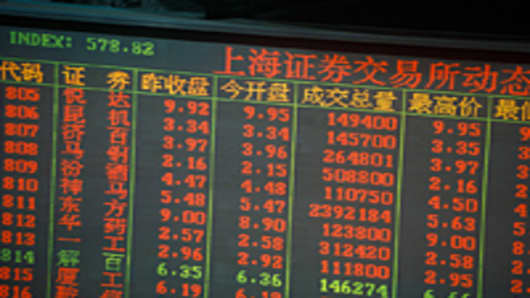Data released on Thursday by the world’s second-largest economy showed the slowdown that’s been underway since late last year is accelerating. The rebound that most economists had expected in China in the second half of the year following rate cuts in June and July has failed to materialize.
But rather than being glum, investors are betting on still more stimulus, propelling stocks and the Australian dollar higher on Thursday
“It’s one of these situations where it’s so bad, it’s good,” John Woods, Chief Investment Strategist for Asia Pacific at Citi Private Banking told CNBC’s “Worldwide Exchange”. “The numbers were pretty lackluster… there were some signs, in my view of stability, but little in the way of recovery.”
China’s Shanghai Composite finished up 0.6 percent on Thursday after data showed inflation fell to a 30-month low and industrial production droppedto the lowest in just over three-years. Retail sales numbers also missed expectations.
The numbers are prompting some bears to grow more confident that the much-feared “hard landing” scenariofor China is finally underway.
Patrick Chovanec, Associate Professor at Tsinghua University’s School of Economics and Management, told CNBC on Thursday that China’s economy is, in reality, probably growing at about 4 to 5 percent right now. Growth of around 5 percent or below, is seen by many economists as a “recession” in China’s case.
Economists and strategists expect more rate cuts as well as cuts in the reserve requirement ratio (RRR) but they also point out that the window for more monetary stimulus may be closing, as higher food prices are likely to lead to an acceleration in inflation later this year, limiting the room to manoeuvre.
“We as a house are expecting another rate cut soon and another couple of RRR cuts soon in order to support this underlying domestic demand story,” Woods said.
Fiscal Stimulus Next?
But incremental rate cuts may not do the trick anymore and Jing Ulrich, Chairman of Global Markets, China at JPMorgan says policymakers will have to “get much more creative to boost the economy.”
Most analysts don’t expect China to go in for another big stimulus package along the lines of its 2008-2009 program. At the time, China announced spending worth $586 billion or around 14 percent of its GDP.
That spending is blamed for many of China’s economic problems in subsequent years, including local government debt and over-investment in housing and higher inflation.
But Ulrich says China could cut taxes much more aggressively to support domestic demand.
“China is in a unique position because it does have a very strong financial and fiscal position. The central government has a very strong tax intake, it can afford tax reductions, while other governments cannot,” Ulrich said.
-By CNBC's Deepanshu Bagchee
@DeepBagchee



